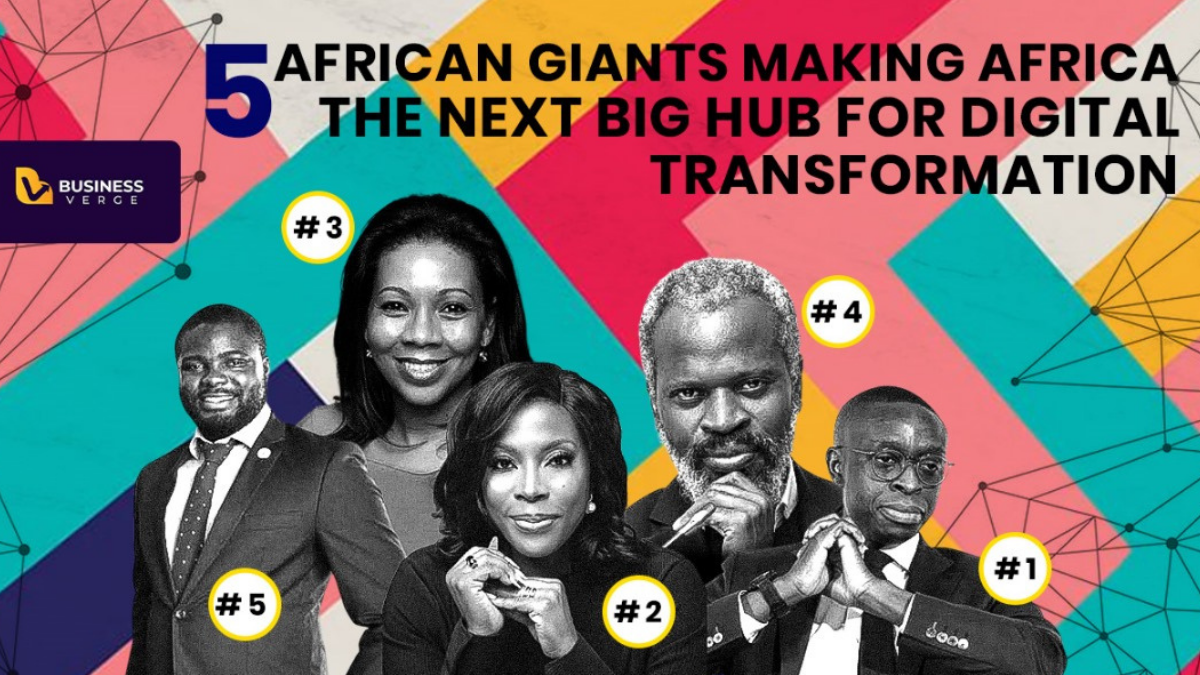But it’s important to understand that Africa’s digital transformation isn’t just a tech story; it’s a human story. Think about how fintech has already changed the lives of millions, giving people access to financial services they’ve never had before. Or consider how telemedicine is bridging health care gaps in remote areas. These are not abstract ideas—they’re real, tangible changes that are happening because of digital innovation. The people of Africa are not just passive consumers of technology; they are the driving force behind this movement, shaping solutions that work for them. The world needs to see that Africa is not waiting to be invited to the table—it’s building the table.
Business Verge
Introduction
Africa is no longer just the continent with untapped potential—it’s quickly becoming the world’s next big hub for digital transformation. For years, conversations about Africa were centred on its natural resources, but today, the spotlight has shifted to something even more valuable: its digital future. With a young, tech-savvy population, increasing access to mobile technology, and a growing digital economy, Africa is showing the world that it’s ready to take the lead in the next wave of global innovation. But are we fully grasping what this means?
Let’s pause for a moment and look at the facts. Africa has the world’s youngest population, with over 60% of people under the age of 25. This means that in a world rapidly shifting toward technology, Africa is already ahead of the curve in one key area: human capital. But beyond that, mobile phones have become lifelines across the continent, not just for communication but for banking, health care, and even agriculture. In fact, 800 million Africans now have access to mobile phones. Imagine the possibilities when you have a continent of young, mobile-connected innovators ready to build solutions that address their unique challenges. It’s not just about catching up—it’s about leading.
The question then becomes: have we really sought out all the possibilities? While Africa’s tech hubs in Nigeria, Kenya, and South Africa are growing at lightning speed, there’s still so much more that remains unexplored. From renewable energy that can power digital infrastructure to the sheer volume of data waiting to be harnessed, Africa’s untapped digital potential is vast. It’s not just about technology for technology’s sake—this transformation could create new jobs, improve education, and provide millions with access to services that can elevate their quality of life. Yet, many areas remain underserved, and the challenge is ensuring that digital progress reaches every corner of the continent.
But it’s important to understand that Africa’s digital transformation isn’t just a tech story; it’s a human story. Think about how fintech has already changed the lives of millions, giving people access to financial services they’ve never had before. Or consider how telemedicine is bridging health care gaps in remote areas. These are not abstract ideas—they’re real, tangible changes that are happening because of digital innovation. The people of Africa are not just passive consumers of technology; they are the driving force behind this movement, shaping solutions that work for them. The world needs to see that Africa is not waiting to be invited to the table—it’s building the table.
This article explores 5 African Giants leading the charge in making Africa the next big hub for Digital Transformation. However, it’s important to acknowledge that these five are just a glimpse of the broader movement—Africa’s pool of Innovators and global changers exceeds this number. In future articles under this series, we’ll continue to dive deeper into the emerging tech forces transforming the digital landscape across the continent.
Now let’s take a closer look at these 5 African Giants.
1. Tunde Kehinde – Co-Founder, Lidya
Background:
Tunde Kehinde, a Nigerian entrepreneur, is a Harvard Business School alumnus with a deep passion for transforming Africa’s business landscape through technology. Before co-founding Lidya, Kehinde was the co-founder of Jumia, one of Africa’s largest e-commerce platforms, often referred to as the “Amazon of Africa.” He was born and raised in Lagos, Nigeria, in a family that encouraged education and entrepreneurial thinking. His journey to success was influenced by his father, who was a civil engineer, and his mother, a school administrator.
Education and Career:
Kehinde earned a degree in Political Science from Howard University and later pursued an MBA from Harvard Business School. His education in top institutions provided him with global exposure and networking opportunities, which would prove critical in his ventures.
Kehinde’s career began with roles at various international firms. He worked as a Business Development Manager at Diageo after earning his MBA, before co-founding Jumia Nigeria in May 2012, one of the continent’s largest e-commerce platforms. He served as Managing Director of Jumia, which became Africa’s first unicorn, later listing on the New York Stock Exchange (NYSE).
After Jumia, he co-founded Africa Courier Express (ACE) in late 2013, a logistics company that aimed to provide world-class services to businesses and consumers across Africa. The venture’s B2B and B2C logistics models allowed small and medium-sized enterprises (SMEs) to ship their products both locally and internationally.
Kehinde has been nicknamed ‘The Jeff Bezos of Africa’ by the BBC and C2 Montreal for his visionary approach to e-commerce and logistics in Africa. He remains a vocal advocate for entrepreneurship, often speaking about the need for infrastructure and support to help businesses thrive and contribute to economic diversification.
Achievements:
At Lidya, Kehinde has focused on closing the credit gap for small and medium enterprises (SMEs) across Africa. Under his leadership, Lidya has disbursed thousands of loans to SMEs, helping them grow and contribute to the economy. His fintech venture is also expanding into other African markets, helping to provide much-needed capital to underserved businesses.
2. Rebecca Enonchong – Founder, AppsTech
Background:
Rebecca Enonchong is a Cameroonian entrepreneur with a rich history of advocating for the tech industry in Africa. She was born in Cameroon but moved to the United States when she was a teenager. She comes from a family of professionals, with her father being a well-respected banker, which exposed her to the world of business and finance at an early age. Enonchong’s passion for technology began in her youth when she started programming at age 15.
Education and Career:
Enonchong earned her Bachelor’s degree in Economics from Catholic University in Washington, D.C. She started her career working for organisations like the Inter-American Development Bank (IaDB) and Oracle Corporation. In 1999, she founded AppsTech, a global enterprise application services company headquartered in Bethesda, Maryland. AppsTech became an Oracle Platinum Partner and serviced clients in over 40 countries.
In addition to her work with AppsTech, Enonchong is actively involved in mentoring African tech startups through her work with the African Business Angels Network (ABAN), an organisation she co-founded.
Despite its initial success, establishing AppsTech subsidiaries in various countries, including Cameroon, was challenging. Some subsidiaries eventually closed, highlighting the difficulties of doing business in Africa.
In 2002, she was recognized by the World Economic Forum as a Global Leader for Tomorrow alongside industry icons like Larry Page (Google) and Marc Benioff (Salesforce). Enonchong continues to champion tech innovation in Africa, advocating for increased opportunities for women in the tech space.
Achievements:
Enonchong is celebrated as a fierce advocate for tech innovation in Africa. She has received numerous awards for her work in entrepreneurship and is frequently recognized for her role in empowering women in tech. Her leadership in creating platforms that support startups has contributed to a growing ecosystem of African entrepreneurs.
3. John Kamara – CEO, Adanian Labs
Background:
John Kamara hails from Kenya and has built a reputation as a leader in tech innovation across Africa. While much of his early life remains private, Kamara has shared that his upbringing in East Africa shaped his understanding of the unique challenges faced by local communities. His family, particularly his mother, played a significant role in encouraging him to pursue education and entrepreneurship.
Education and Career:
Kamara studied in Kenya before pursuing higher education in business and technology abroad. He has over 20 years of experience working in international technology sectors, including roles in Europe and the U.S. He returned to Africa with a vision to build a stronger tech ecosystem on the continent. Kamara founded Adanian Labs, a venture studio that provides African startups with funding, technology, and mentorship to scale their businesses.
Achievements:
Adanian Labs is focused on nurturing tech startups that address critical challenges in healthcare, agriculture, and financial services. Kamara is committed to leveraging tech solutions to empower local communities, ensuring that African innovations have a global impact. Under his leadership, Adanian Labs has supported several high-growth startups, helping them secure funding and develop innovative solutions that are making waves across Africa.
4. Juliet Ehimuan – Founder and CEO, Beyond Limits
Background:
Dr. Juliet Ehimuan was born and raised in Benin City, Nigeria, in a close-knit family that emphasised education and hard work. Her father was a professor of engineering, which likely influenced her early interest in science and technology. She credits her parents for fostering her love for learning and encouraging her to pursue a career in technology.
Education and Career:
Ehimuan is a graduate of Obafemi Awolowo University in Nigeria, where she earned a degree in Computer Engineering. She then went on to earn a Postgraduate Degree in Computer Science from the University of Cambridge and later completed her MBA from London Business School and completed executive education programs at Harvard Business School. Before joining Google, she held leadership roles at companies such as Microsoft and Shell Petroleum. She then went on to earn a Postgraduate Degree in Computer Science from the University of Cambridge and later completed her MBA from London Business School. Ehimuan also holds a Doctor of Business Administration (DBA) from Walden University.
Juliet started her career at Shell Petroleum Development Company as a Performance Monitoring and Quality Assurance Supervisor. She then transitioned to Microsoft UK, where she oversaw projects for MSN subsidiaries in the EMEA region. In 2011, Ehimuan became Google’s Country Manager for Nigeria, and by 2017, she rose to the position of Director for West Africa.
Beyond her corporate roles, Ehimuan founded Strategic Insight Consulting Ltd. and leads the Beyond Limits Africa initiative, focusing on leadership development. She has received numerous awards, including being named by Forbes as one of the top 20 power women in Africa and by London Business School as one of 30 people changing the world.
Achievements:
As Google Nigeria’s Country Director, Ehimuan has played a pivotal role in expanding digital literacy across Africa. She spearheaded initiatives such as Google’s Digital Skills for Africa, which has trained millions of Africans, empowering them with the skills needed to thrive in the digital economy. Ehimuan is also an advocate for women in tech, frequently speaking on the importance of closing the gender gap in the industry.
5. Iyinoluwa Aboyeji – Co-Founder, Flutterwave and Andela
Background:
Iyinoluwa Aboyeji was born in Lagos, Nigeria, to a family that placed a high value on education. His father, a banker, and his mother, a civil servant, nurtured his entrepreneurial spirit from an early age. Growing up, Aboyeji was a curious and ambitious student who was always looking for ways to solve problems in his community.
Education and Career:
Aboyeji studied at the University of Waterloo in Canada, where he pursued a degree in Legal Studies. It was during his time at university that he became involved in various tech initiatives, sparking his passion for technology and entrepreneurship.
Aboyeji’s entrepreneurial journey began when he co-founded Andela in 2014, a company focused on connecting African software developers with global tech companies. In 2016, he co-founded Flutterwave, a fintech startup that has since become one of Africa’s leading payments platforms.
Today, Aboyeji is the General Partner and co-founder of Future Africa, a platform that provides capital, coaching, and community for mission-driven entrepreneurs. He also co-founded Talent City Inc., a construction company, and serves as an advisor for various startup funds and networks.
In 2019, Aboyeji became involved in Nigerian politics by serving as the deputy director-general for Oby Ezekwesili’s 2019 presidential campaign.
Achievements:
Aboyeji’s ventures have had a profound impact on Africa’s tech ecosystem. Andela has trained and placed thousands of African developers in top tech companies worldwide, while Flutterwave has facilitated billions of dollars in transactions across Africa. His work is helping to create a bridge between Africa and the global economy, proving that African talent and innovation can compete on a global scale.
Conclusion:
These leaders are at the forefront of Africa’s digital transformation, using their knowledge, skills, and passion to drive change across the continent. Their personal and professional journeys reflect the unique opportunities and challenges faced by African entrepreneurs. Through their leadership, they are laying the foundation for a thriving digital economy in Africa, positioning the continent as a future leader in global tech innovation.
When we talk about Africa’s digital future, it’s essential to keep the conversation going. What role will global tech giants play in this transformation? How can African innovators ensure that digital progress is inclusive, reaching rural and marginalised communities? As we explore these questions, one thing is clear: Africa’s digital journey is just beginning, and the world is watching.
This growing momentum, coupled with the continent’s wealth of resources—both human and natural—positions Africa as the next frontier for global tech and innovation. Whether in e-commerce, blockchain, or artificial intelligence, Africa’s digital transformation story is one to watch, as it promises to reshape not only the continent’s future but the global digital landscape.









Leave feedback about this